The Faculty of Kinesiology and Physical Education (KPE) hosted the 34th annual University of Toronto Sports Hall of Fame (HOF) induction ceremony on May 25. 12 individuals and six teams were inducted for their outstanding achievements and contributions to varsity athletics as athletes, coaches or builders.
Professor Gretchen Kerr, dean of KPE, Beth Ali, executive director of athletics and physical education at U of T, Ennis Blentic, director of KPE advancement, and Jen Button, president of the T-holders' association, were all on hand to welcome the new inductees and congratulate then on this prestigious recognition.
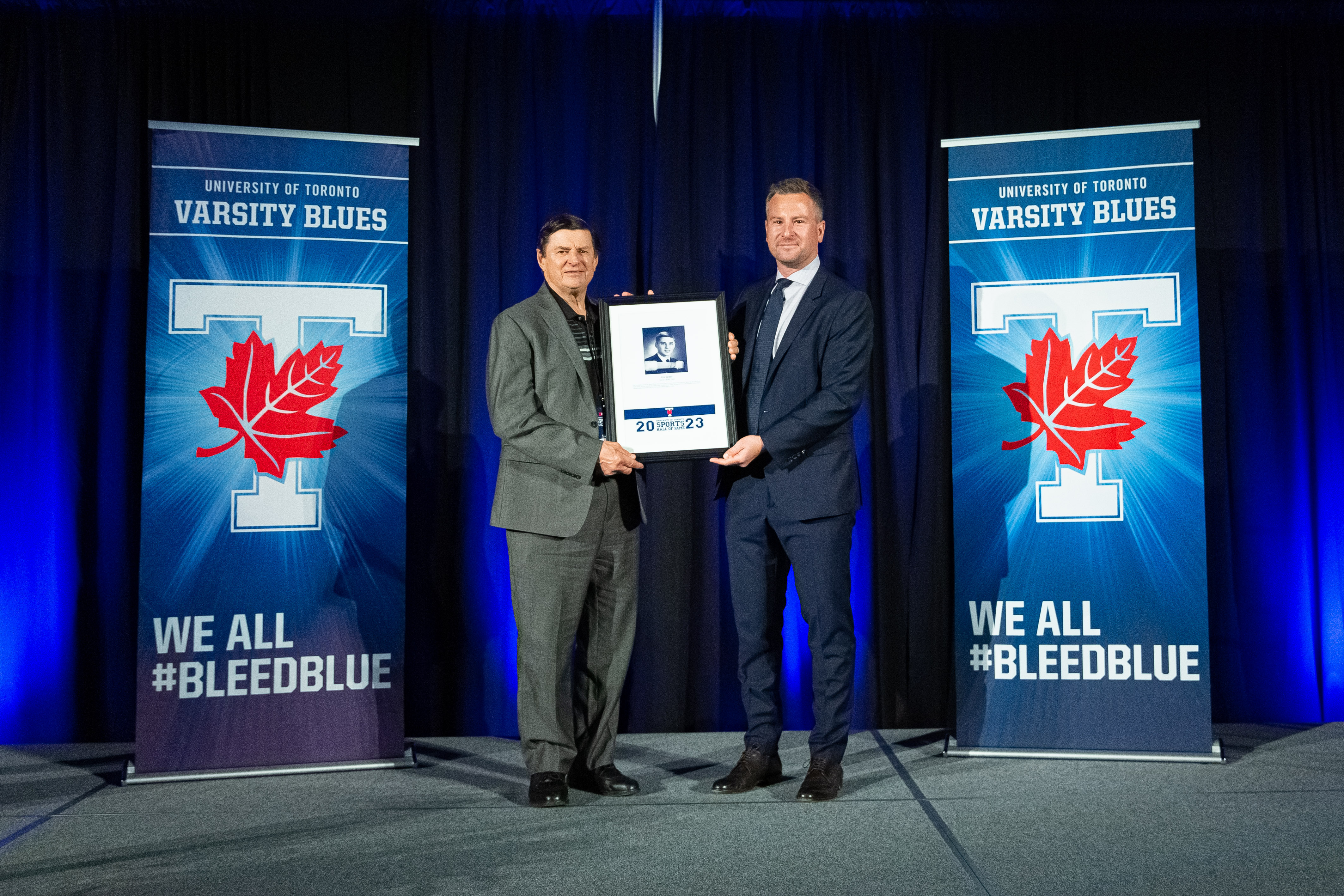
Eric Sereda, left, with Ennis Blentic, director of KPE advancement
It was the best of times, it was the worst of times, wrote Charles Dickens in A Tale of Two Cities. For Eric Sereda, who played soccer for the Varsity Blues men’s team from 1965 to 68, those were the best of times - period.
Sereda, who graduated with a Bachelor of Physical Health and Education degree at U of T in 1969, was captain of the team in his final season. The team won five consecutive Ontario Quebec Athletic Association (OQAA) championships, losing only one game in five years. Competing against the University of Montreal, they played in 10 inches of snow and won 12 to 1.
“I played with a team of skilled and outstanding individuals,” said Sereda, who was one of 12 individuals to be inducted into the 2023 U of T Sports Hall of Fame on May 25. “We had the greatest camaraderie. To this day I value the friendships that we developed.”
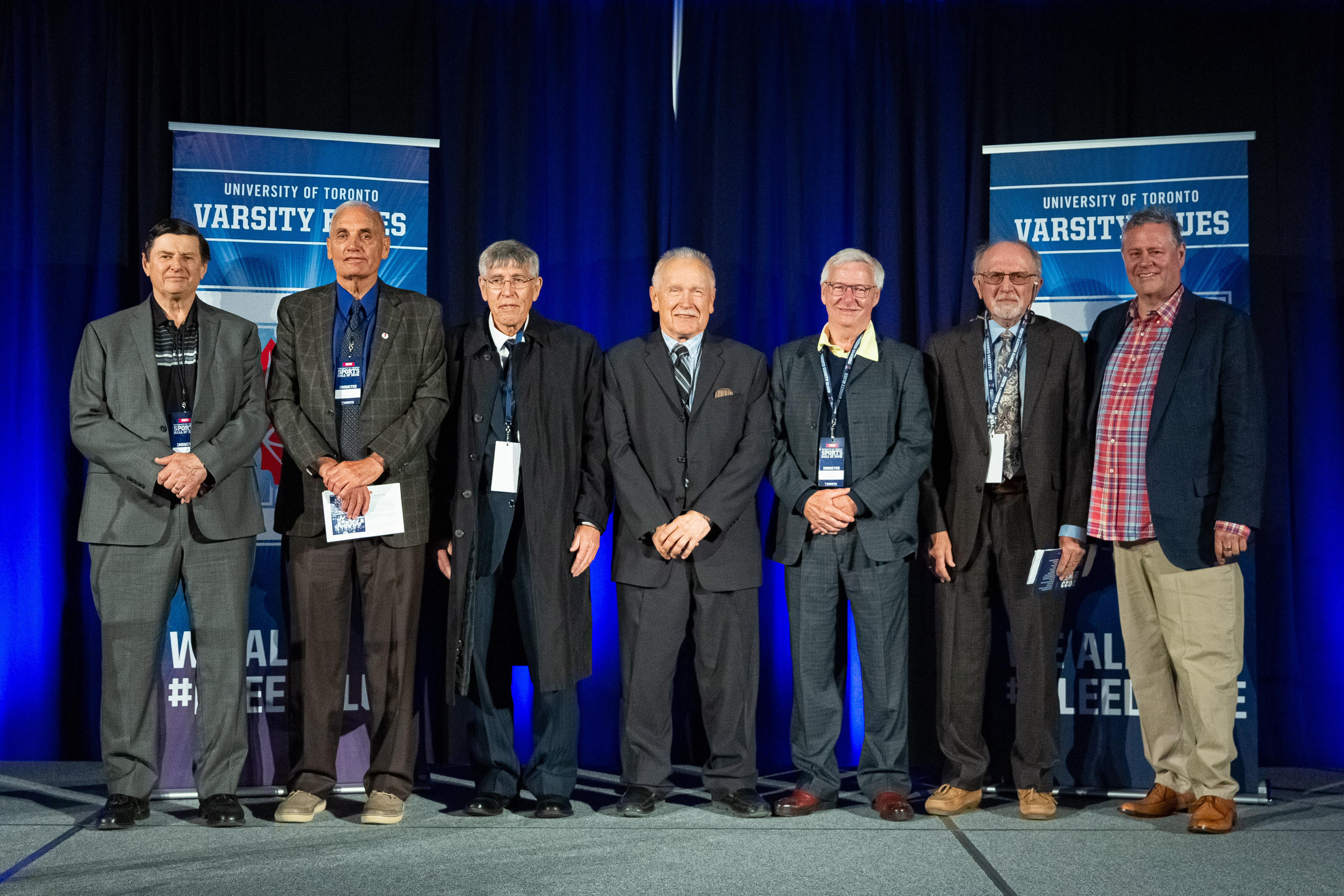 Members of the 1967-68 and 1968-69 men's soccer team
Members of the 1967-68 and 1968-69 men's soccer team
Bill Nepotiuk spoke on behalf of the inducted 1967-68 and 1968-69 men’s soccer team. He thanked coach Ernie Glass, represented at the event by his son Jamie, for his leadership.
“He never yelled or screamed at anyone,” said Nepotiuk. “Always positive, he instilled his philosophy of hard work and determination. No prima donnas or inflated egos were allowed.”
Recalling high points from the team’s history, Nepotiuk said the team had a three-year run of undefeated seasons at the inter-collegiate level, playing 26 games, winning 25, tying one and losing none.
“Thank you to the University of Toronto for providing an athletic program that allowed our team to go on such a magical ride,” he said. “It was truly an honour.”
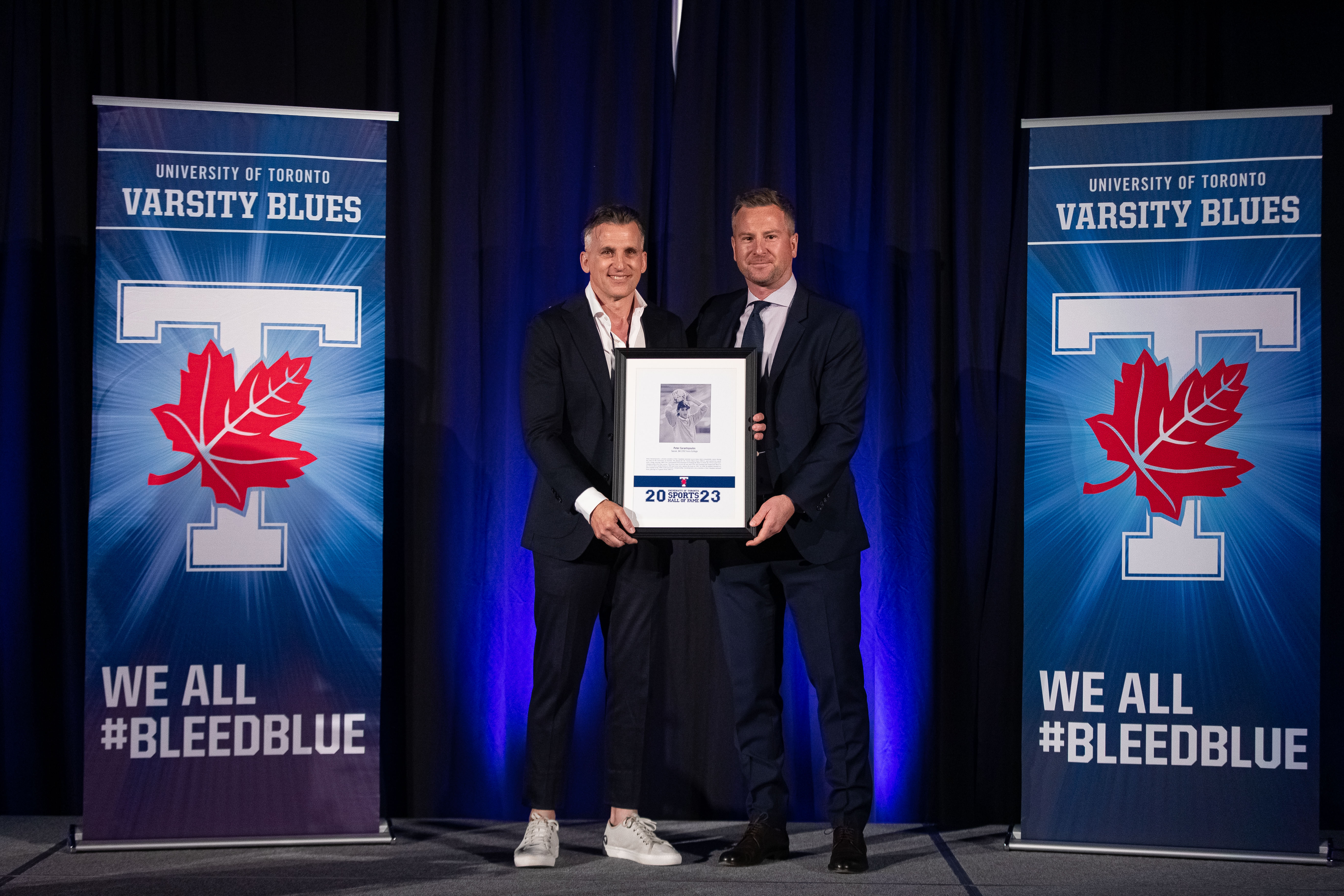
Peter Sarantopoulos, left, with Ennis Blentic
Peter Sarantopoulos, who graduated from Innis College in 1992, played soccer for the Blues from 1988 to 91, earning the Canadian Interuniversity Athletics Union (CIAU) tournament MVP honours in just his first year. Sarantopoulos went on to play 25 games for Canada’s national soccer team between 1988 and 93. Speaking at the induction ceremony, he said the biggest victory he got out of playing for the Blues was winning friendships.
“I often walk by the Varsity Stadium on St. George campus with a big smile on my face and my kids tell me to get over it,” joked Sarantopoulos. “Now they’ll have to see my face on the U of T Sports Hall of Fame display board at the Goldring Centre every time we walk by. It’s such a special feeling.”
Friendship was the common theme throughout the evening, which saw one athlete after another share stories - and a few tears - about the best time of their lives.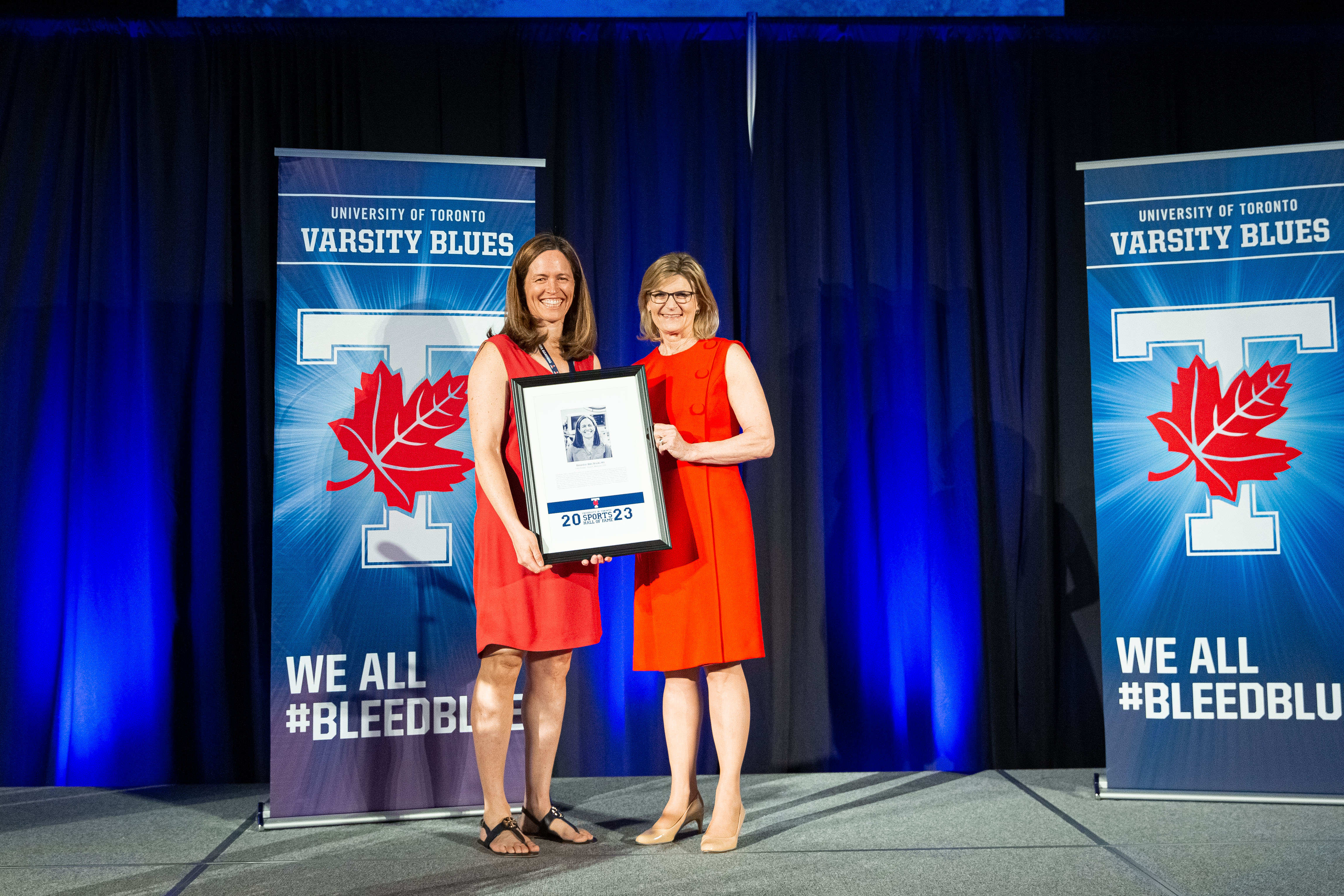
Alexandra (Alex) Brooks-Hill, left, with Professor Gretchen Kerr, dean of KPE
Alexandra (Alex) Brooks-Hill excelled at field hockey and squash at U of T while pursuing her medical degree. She won gold medals at the 1992 Ontario University Athletics championship and the 1993 and 1996 Canadian championships, among a plethora of other accomplishments.
Remembering her days on the field hockey team, Brooks-Hill praised her teammates and coach Liz Hoffman, who would go on to become U of T’s director of athletics.
“Liz Hoffman provided me with support on and off the field,” said Brooks-Hill, who remembered a pep talk Hoffman gave the team after they lost a match and were feeling particularly deflated. “She told us this was the best time of our lives. She was right.”
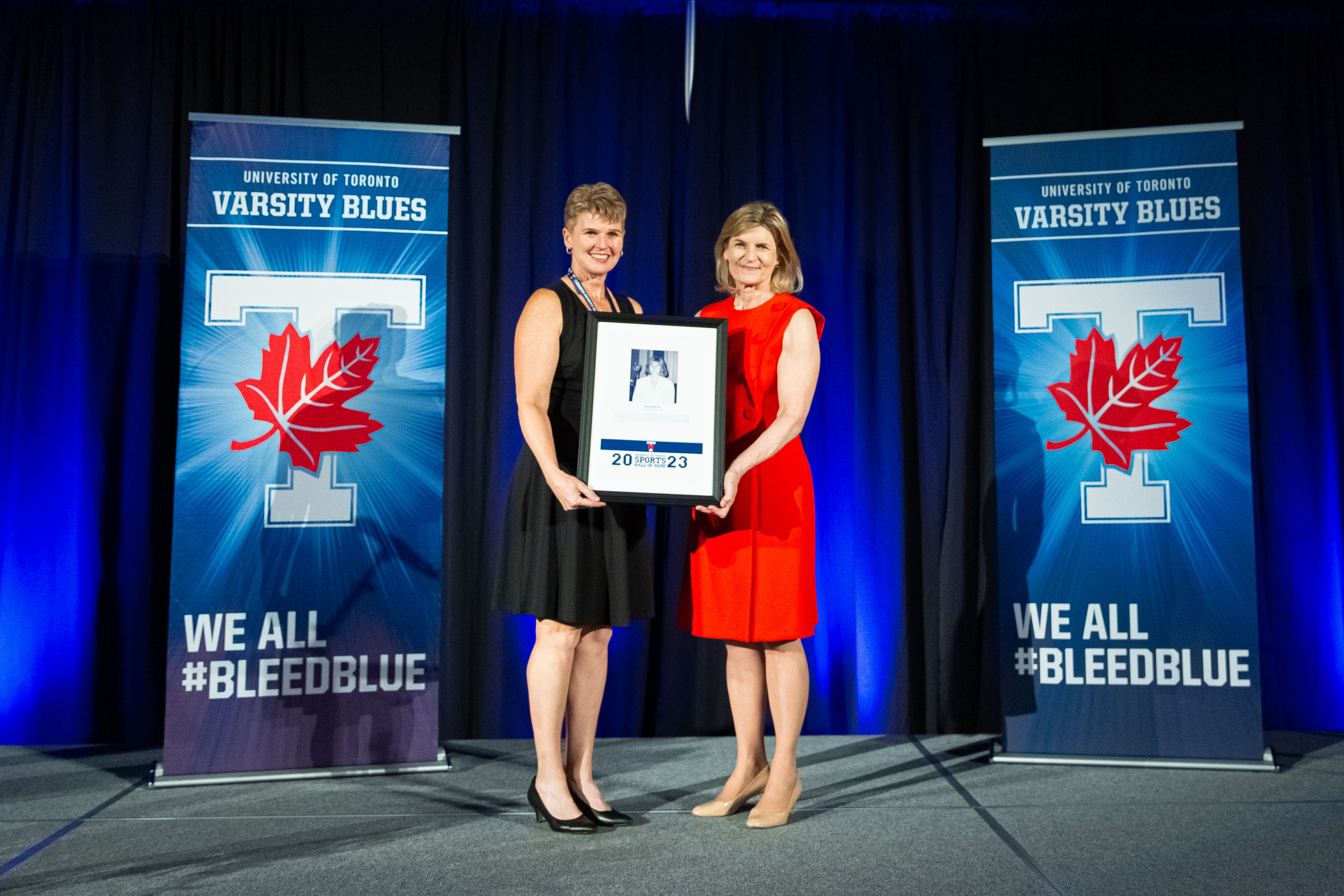
Dana Anderson, left, and Dean Kerr
Brooks-Hill’s teammate Dana Anderson was an integral member of the 1993 and 1996 CIAU championships teams, earning championship MVP honours at the 1996 tournament. Reflecting on the dedication the team had for the sport and each other, she said she knew she gave it her all on the field when she had to lean on her teammates to walk up the stairs for a press conference after winning the championship. Anderson graduated with a bachelor of science from U of T in 1996.
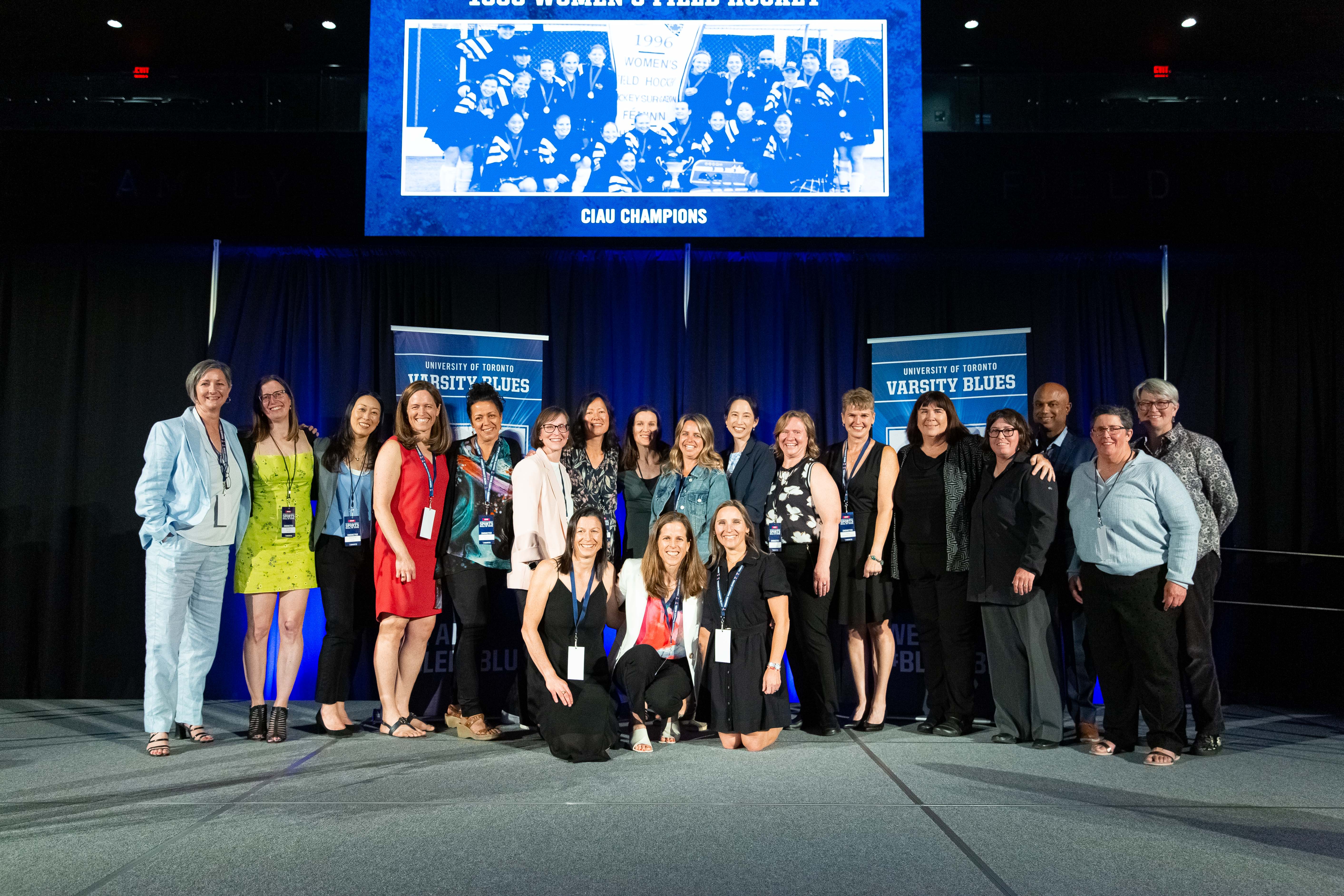
The 1996 women's field hockey team
Rebecca (Becky) Moore spoke on behalf of the inducted 1996 women’s field hockey team. Calling her decision to join the Varsity Blues 30 years ago one of the best decisions of her life, she listed some of the life lessons this experience taught her and the team.
“We learned we could do hard things, tolerate discomfort, prioritize, stay committed, face fears,” she said.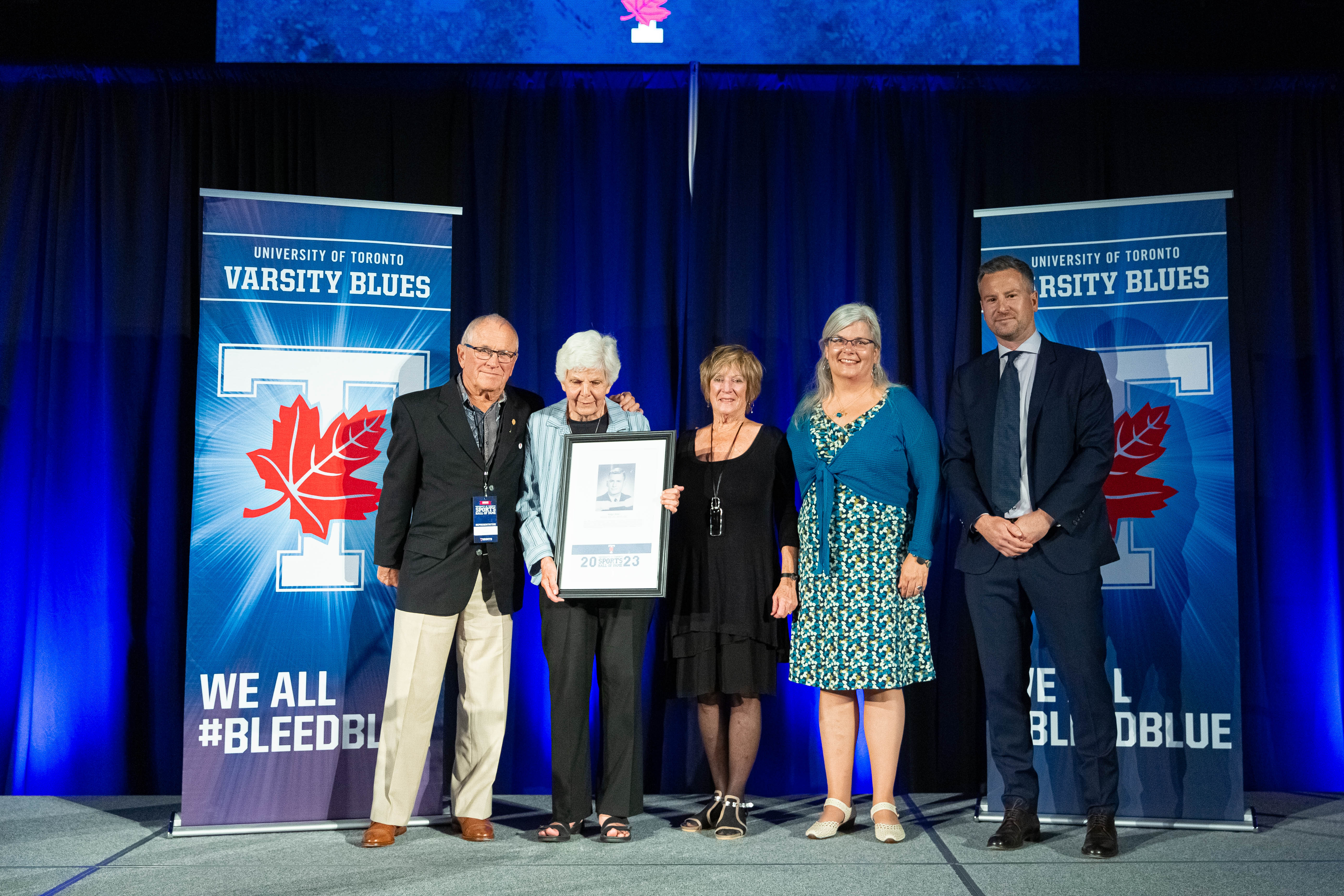
Rodger Doner's family with director of KPE advancement Ennis Blentic on the right
Rodger Doner’s brother Jim spoke on behalf of the wrestling champ and BPHE and dentistry graduate. Doner was a member of three OQAA championship teams between 1958 and 1961 and won individual OQAA titles in 1960 and 1962. He also represented Canada at the 1964 Tokyo Olympics, a highlight of his career. In later life, he became an avid sailor.
“In a series of seven legs over a period of six years, he circumnavigated the globe in his 35 ft sailboat. He lived an exceptional life.”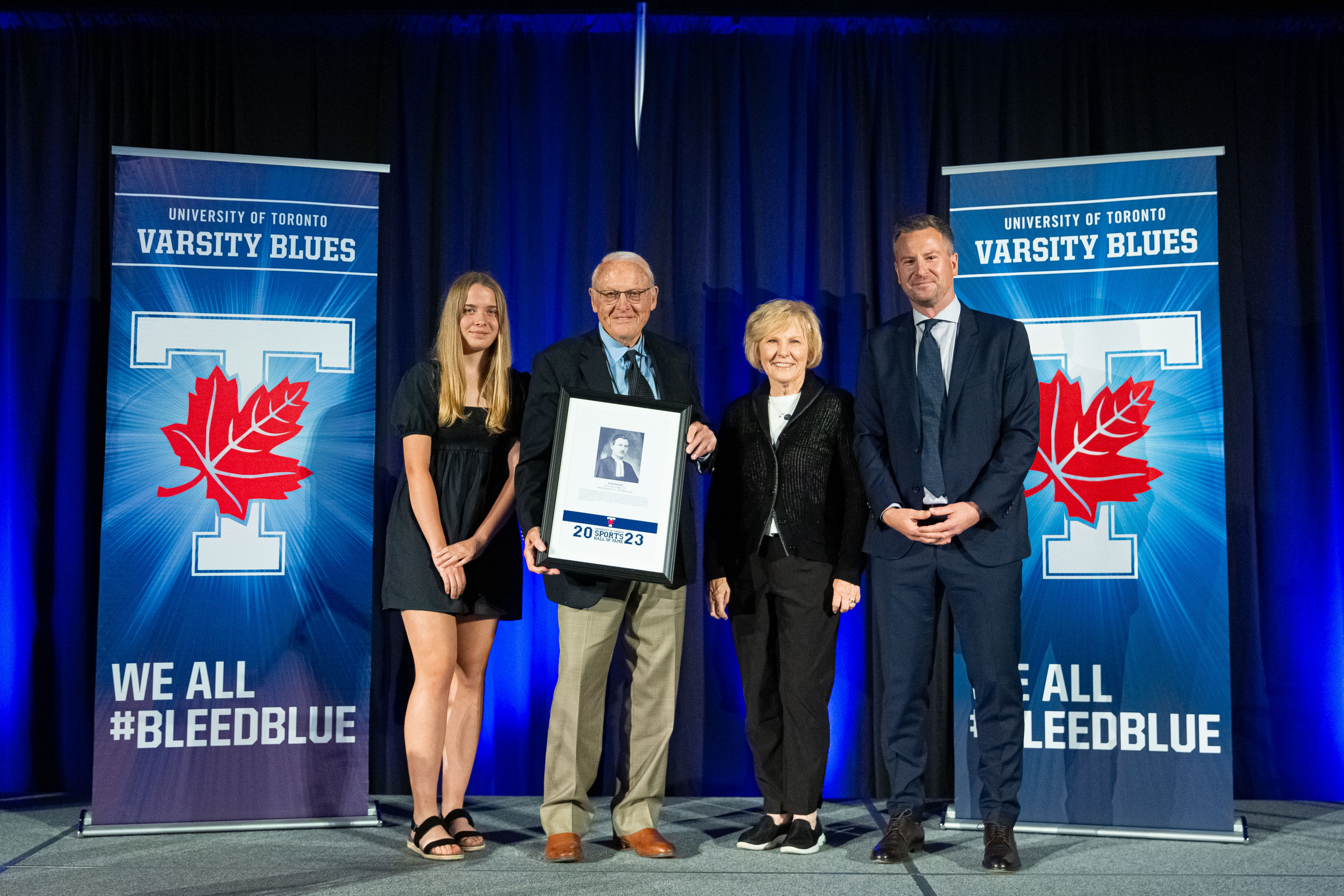
David Rowland's family with Ennis Blentic on the right
David Rowland was a talented soccer player, who graduated from Knox College in 1935 and also served as the team’s manager during that time. During World War 2, Rowland served as the chaplain of the Irish regiment of Canada and in 1956, he was awarded an honorary degree from Knox College.
Rowland’s son Barry accepted the award on his behalf, saying the induction of his father into the U of T Sport Hall of Fame completes the circle, with his granddaughter (and Rowland’s great granddaughter) Kaylin now a member of the U of T Track Club (UTTC) junior development program.
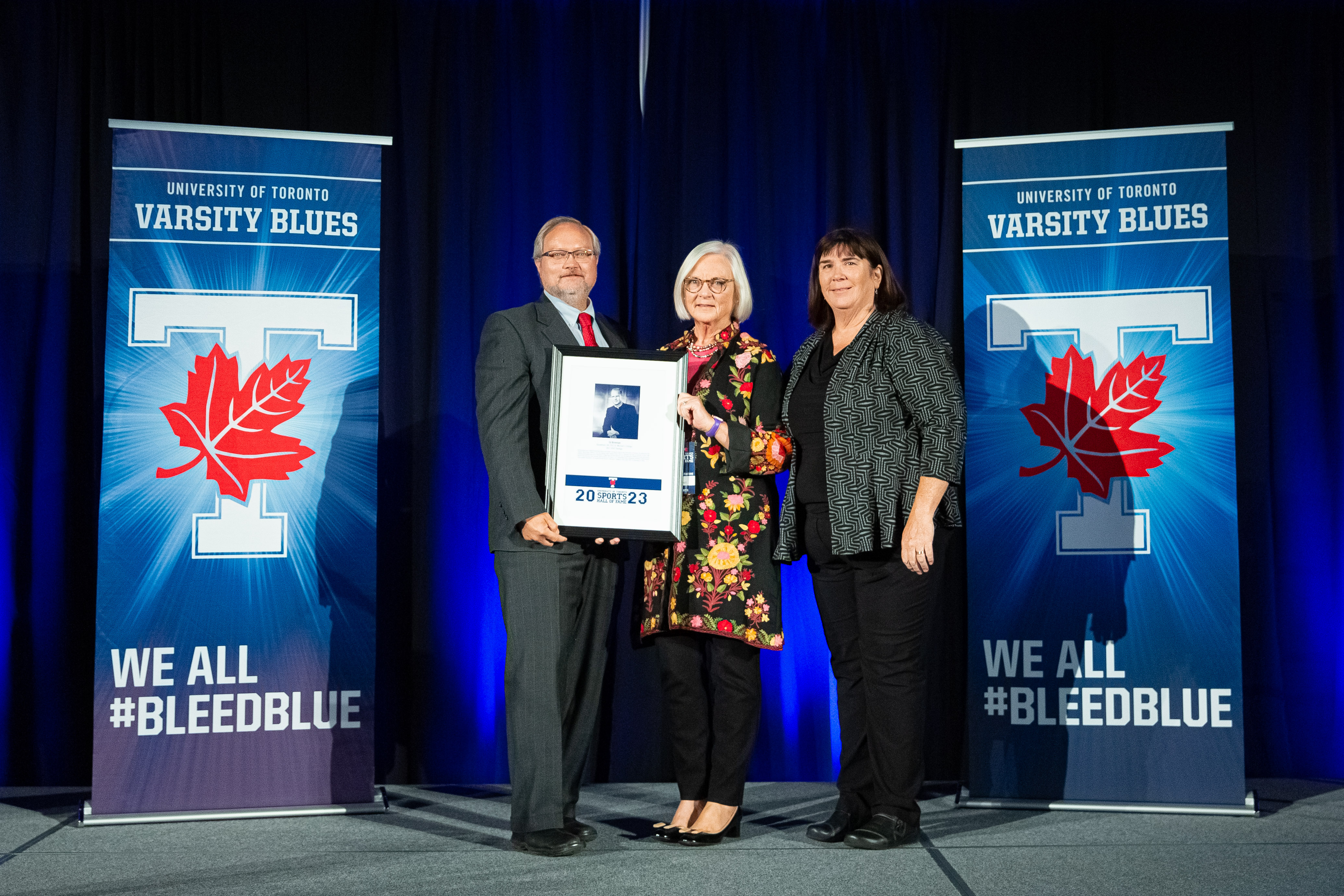
Ed Brennan's family with Beth Ali, director of athletics and physical education at U of T
Ed Brennan was a skilled basketball player during his time at U of T, where he earned his bachelor of arts in 1952 from St. Michael’s College and a BST in theology in 1958. Accepting the honour on his behalf, Brennan’s niece Terri described him as “the original fun uncle, fiercely competitive and compassionate at the same time.” Brennan left the priesthood in the 70s to get married and continued to work for peace and justice until the end of his life.
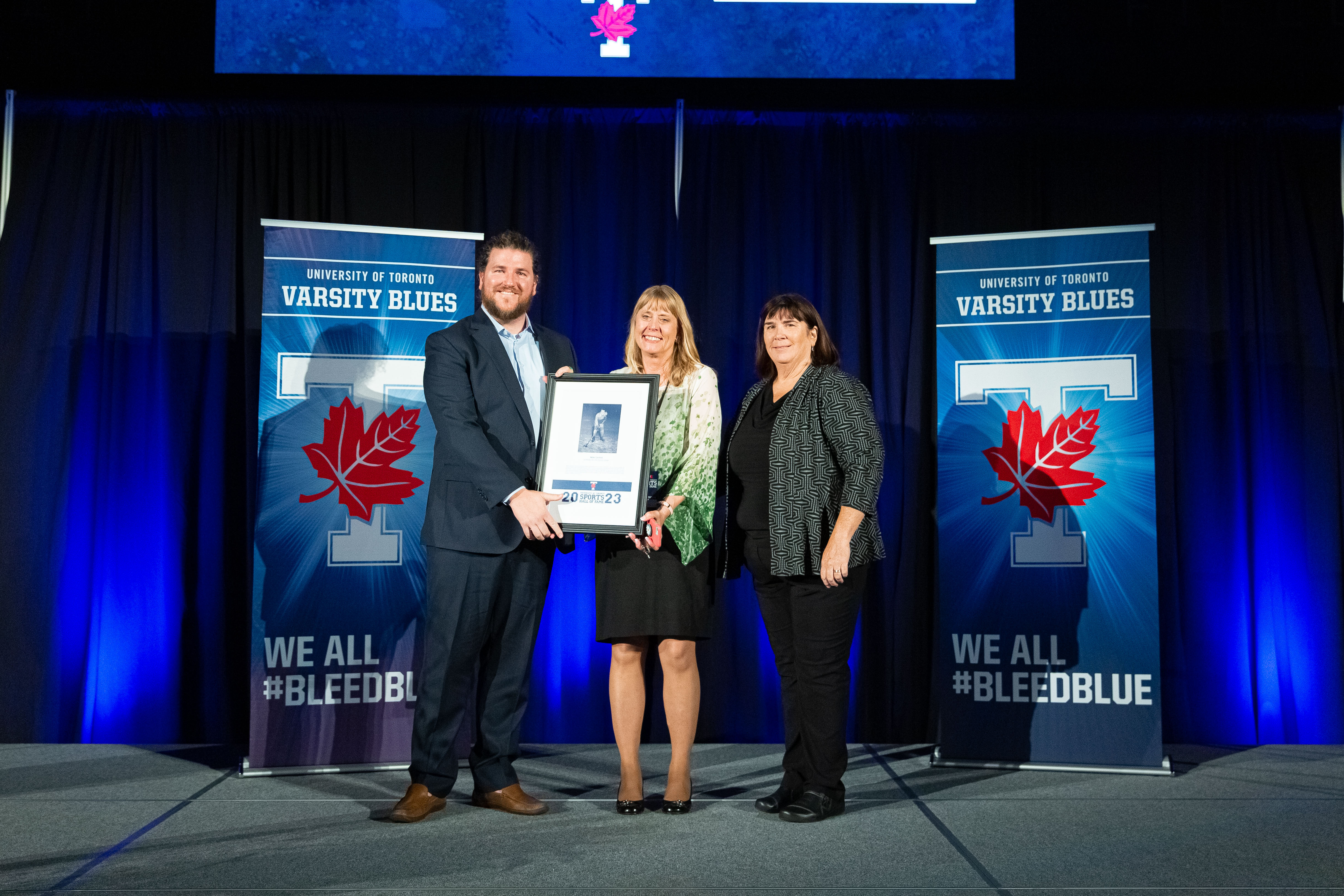
Helen Carefoot's family and Beth Ali on the right
Helen Carefoot’s niece Ann was equally fond of her aunt, whom she described as someone who would step into every opportunity life afforded her. Carefoot graduated from Victoria College in 1934 and during that time helped lead the ice hockey team to victory as intramural champions in both 1942 and 1943. She also served as president of the Victoria College women’s athletic association. Carefoot went into law school and practiced law when few women did, said her niece, and golfed and skied well into her 70s.
“She was dignified and gracious, judicious towards others and taught me there was nothing a woman can’t do.”
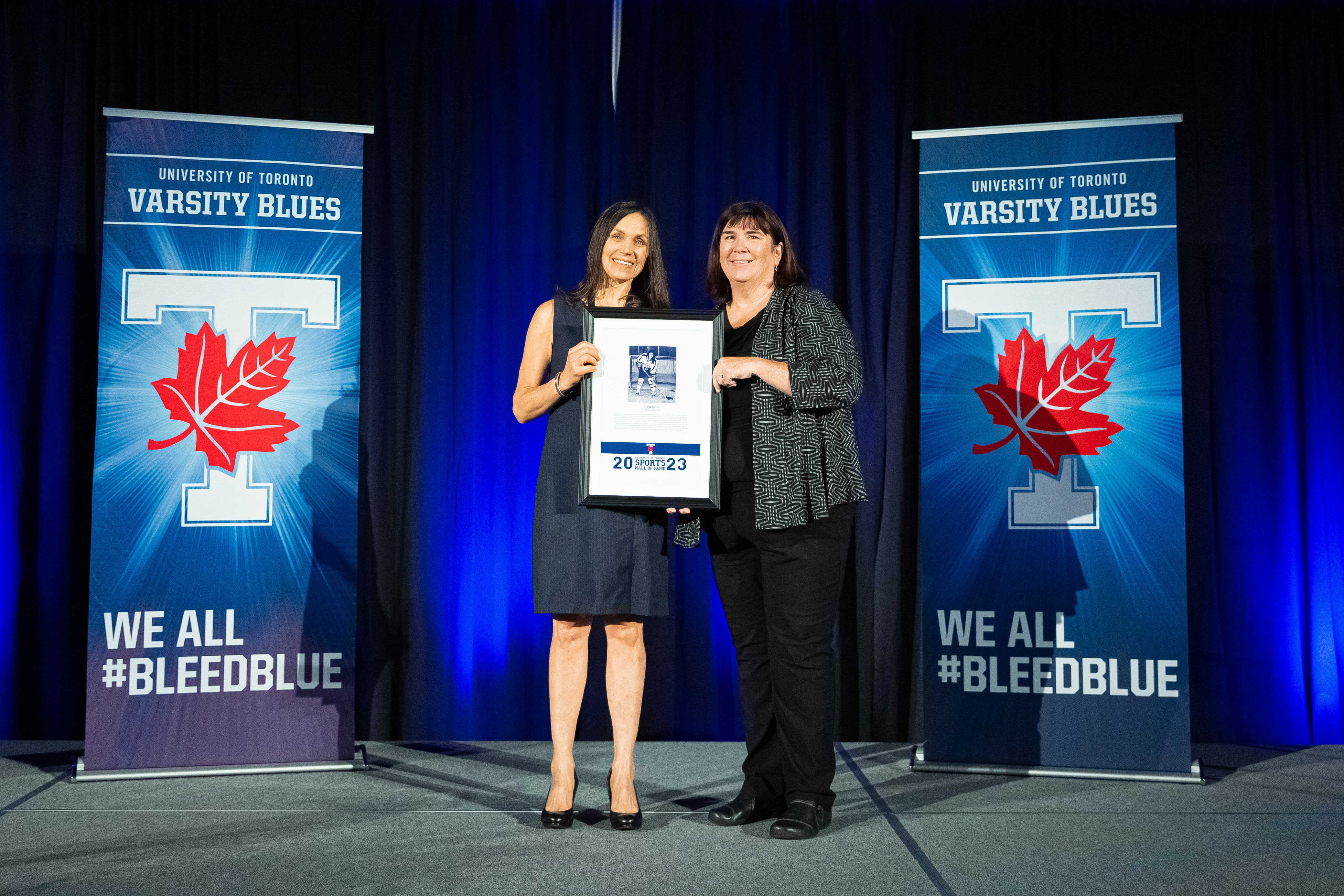
Andria Hunter, left, and Beth Ali
Andria Hunter’s dream of playing hockey at U of T became a reality when she went into graduate school for computer science and started playing for the Blues.
“Looking back through my hockey photo albums, what stood out about our team was how tight-knit we were,” said Hunter. “We had so much fun, both on and off the ice. I believe that this led to our unity as a team and ultimately to our success on the ice.”
The inducted 1990-91 and 1991-92 team won the OWIAA championship an impressive five years in a row. 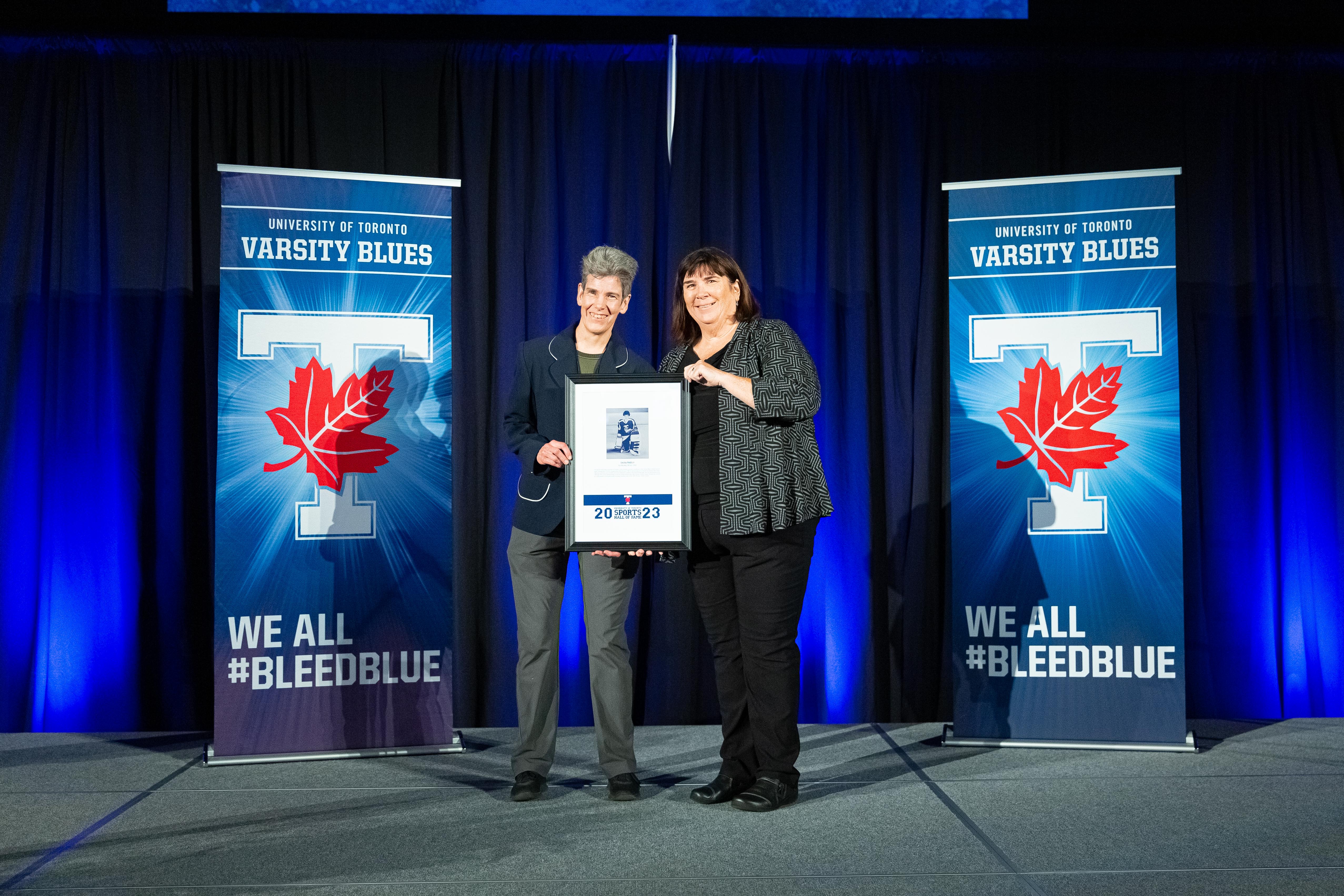
Lesley Reddon, left, and Beth Ali
Lesley Reddon, who graduated from U of T with a bachelor of commerce in 1993, was a key contributor to the Varsity Blues women’s ice hockey team between 1989 and 1993. After her university career, Reddon went on to represent Canada on the international stage, winning gold medals at the 1994 and 1997 world championship, as well as a silver medal at the 1998 Olympic Winter Games.
She said she always wanted to be a goalie and thanked her dad for practicing with her when she was a young girl.
“Any success we have is a sum of all parts,” she said. “My U of T experience was a great springboard for everything I did later in life.”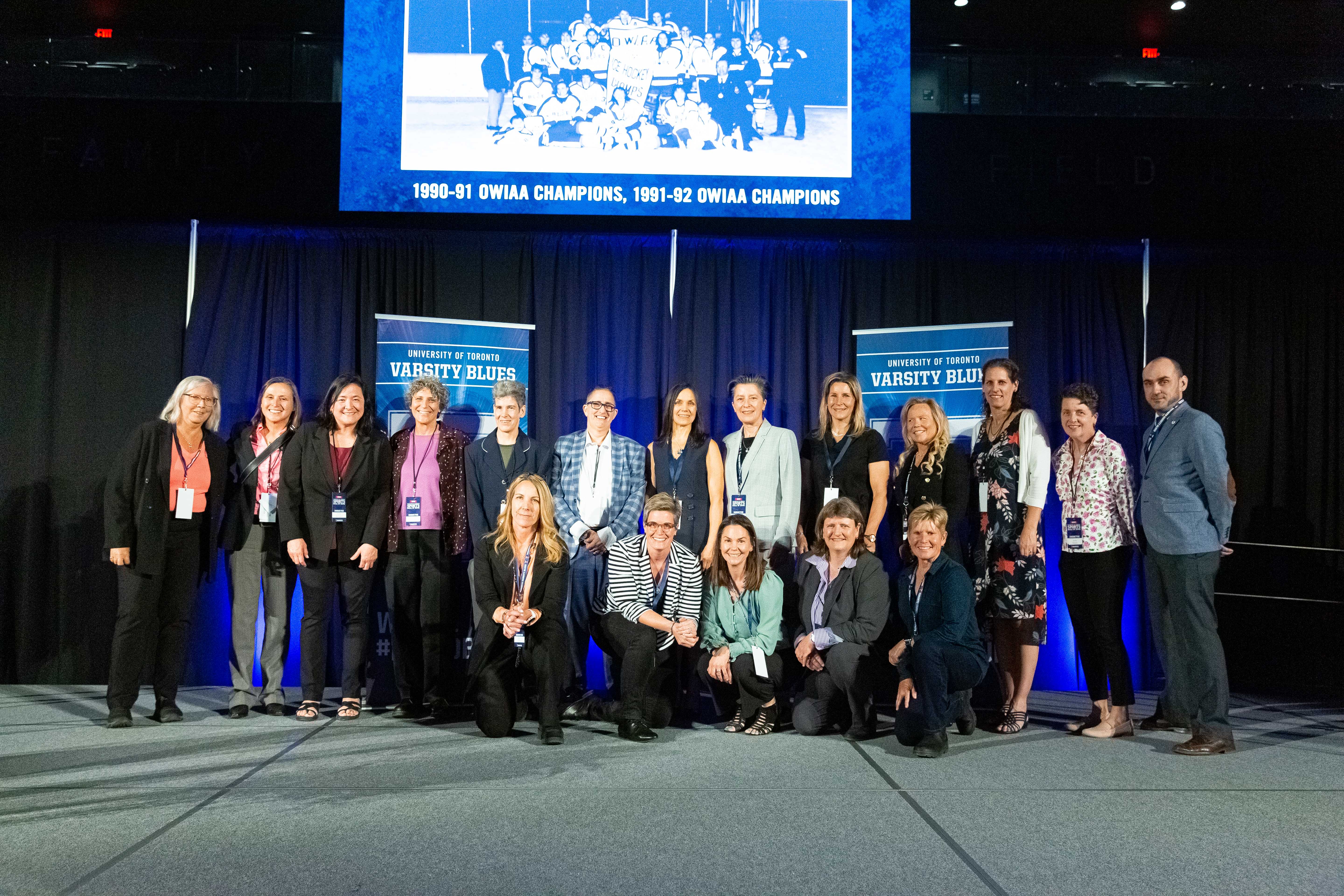
The 1990-91 & 1991-92 women’s ice hockey team
Laurie Taylor Bolton, who spoke on behalf of the inducted 1990-91 & 1991-92 women’s ice hockey team, said playing for the Blues was the best part of her university experience.
“We learned about commitment, strategy, humility, loyalty and friendship along with so many other life skills,” she said. “Looking back, I struggle to remember the scores, but I remember endless laughs and moments of friendship. It was a golden time.”
Like players before her Taylor Bolton acknowledged the village it takes to raise an athlete – from coaches like Dave McMaster, “who believed in you and made you want to play better and harder for each other,” to parents, who cheered them on in their pursuits.
Also inducted were the 1939-40 men’s boxing, wrestling and fencing team and among them Frederick Fall, who excelled in boxing and helped the team win two league championships in 1927-28 and 1930-31. Fell graduate from engineering in 1933.
William Belfry Hendy, who graduated in 1895 with a bachelor of arts from University College and got a medical degree from U of T in 1904, was inducted as a builder. Hendry was an accomplished athlete and later served as member of the first UTAA men’s athletic directorate and advisory board member. He served as a colonel during WW1 and held positions as a professor of obstetrics and gynecology at U of T, and obstetrician and gynecologist-in-chief at Toronto General Hospital.
